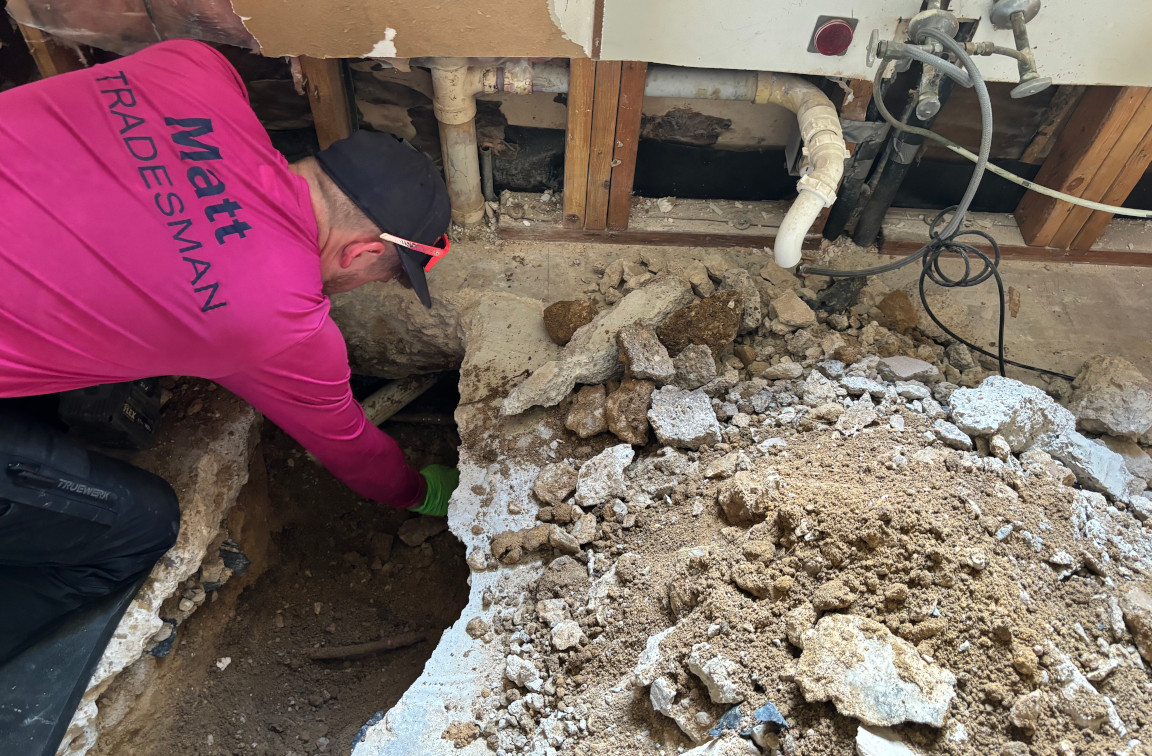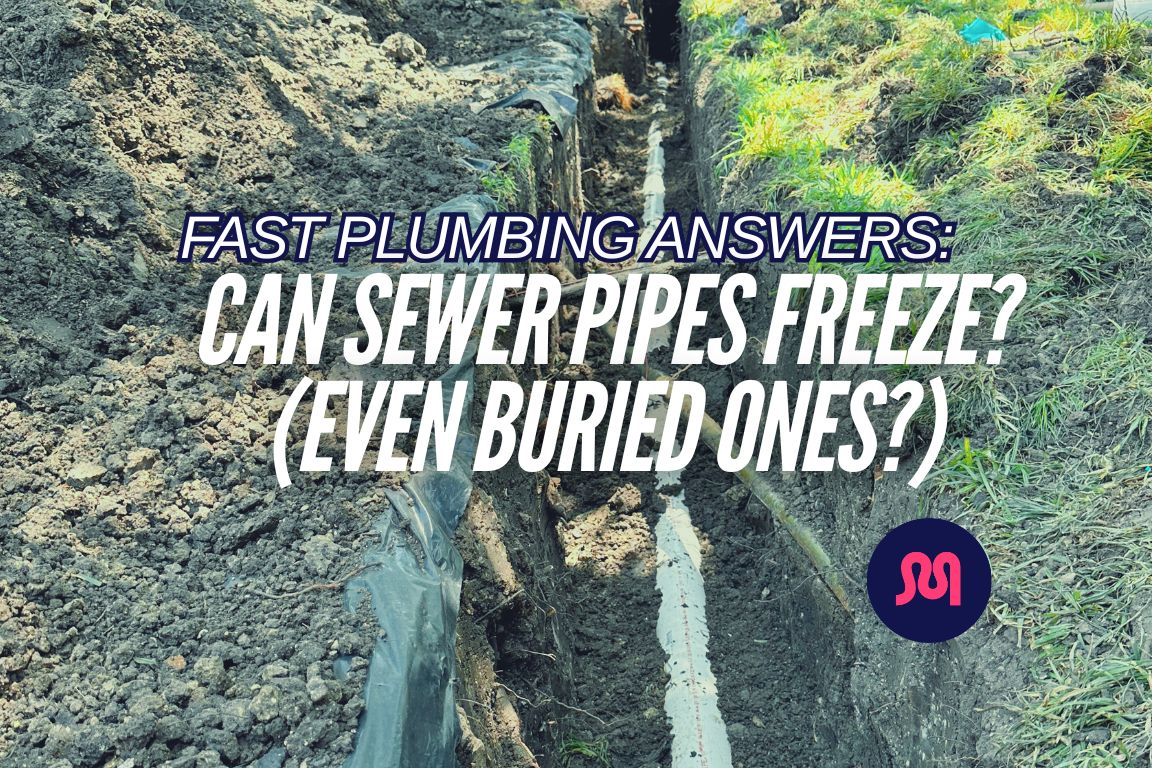Fast Plumbing Answers: Warm Spot on Floor?

table of contents
table of contents
There’s a warm spot on your floor. It’s a little soggy, and it might smell a bit moldy. You’re likely dealing with a hot water pipe leak near or under your slab foundation. Yes, it’s a troubling issue — but it’s also very simple for a licensed plumber to diagnose and fix.
So don’t worry: we’ll answer all your questions in 2 minutes or less.
We’re Mother, a Dallas-Fort Worth plumbing company that provides dependable, hassle-free modern plumbing for homeowners who value quality. Call us 7 days a week for non-invasive slab leak detection services and insightful repair solutions that last.
{{slab-leak-repair="/services/slab-leak-repair"}}
The Warm Spot on Your Floor is Usually a Slab Leak

We rode along with Master Plumber Dillon Ashton on his way to a slab leak detection service call in Dallas. He explained that warm spots on your floor are a clear indication of slab leaks under your house.
“A hot spot on your floor absolutely sounds like a slab leak,” Dillon said. “This means there’s a hot water pipe leaking beneath the floor, around or under your foundation.”
The good news: The reason for warm spots on your floor is much easier to diagnose than cold, damp spots. Cold spots can mean anything from water line leaks to poor insulation. 9 times out of 10, a warm spot is caused by hot water pipe damage.
5 more telltale signs of a slab leak under your floor
Unsure if you have a slab leak? Besides a wet spot on your floor, here are 5 more common symptoms to look for:
- Unexpected increase in your water bill. “Have you experienced a high water bill for no reason?” Dillon asks. If your bill’s going up but your water consumption isn’t, a slab leak is often to blame.
- Low water pressure. Dillon cites poor water pressure to multiple fixtures in your home as another warning sign. This includes weak showers, slow sink faucets and dishwashers that don’t clean effectively.
- Sound of running water. Do you hear running water in your home when all the taps and faucets are off?
- Mold (or moldy smell) in your flooring: A frequent sign of leaks near your concrete slab is a damp, moldy area (or moldy smell) in your floor boards.
- Cracks in walls or foundation: If you notice cracks in your walls or foundation, contact a plumber immediately. This is a late-stage sign of slab leak damage.
{{fast-plumbing-answers-warning-signs-of-a-slab-leak="/blogs/fast-plumbing-answers-warning-signs-of-a-slab-leak"}}
Let’s Solve the Problem: Your 4-Step Action Plan
You have a slab leak under your home, and you’re not sure which pipe is damaged. Don’t stress out — our Master Plumbers created a simple 4-step action plan to diagnose and repair the issue, plus offer a lasting solutions to recurring underground pipe leaks in your home.
- Schedule a hydrostatic test.
- If needed: utilize advanced leak detection methods.
- Explore your slab leak repair options.
- Recurring issue? Consider a smart automatic water shut off valve.
Step 1: Schedule a hydrostatic test
“We perform a hydrostatic test to determine if you have a leak,” Dillon explains. “It also helps identify whether the problem is on the hot water or cold water side.”
The pipe we’re testing is closed on both ends, filled with water and pressurized. Pressure loss within the pipe indicates a leak, and our advanced equipment identifies its location with pinpoint accuracy.
If you have a warm spot on your floor, we test your hot water pipe first. It’s the most likely source of your issue, so starting here is the best way to save money.
Step 2 (if needed): Utilize advanced leak detection methods
If your hydrostatic test reveals no damage in your water line, it’s time to move on to other potential suspects.
Ask your plumber for a list of leak detection services and their precise applications. At Mother Modern Plumbing, we offer a suite of trenchless, no-dig leak location options:
- Acoustic leak detection: Highly-sensitive microphones pick up sound waves from leaking water underground. These sound waves are amplified to analyze patterns and direction. The sound is triangulated to determine the exact location of your yard leak.
- Electronic leak detection: An electronic leak detector senses changes in conductivity due to the presence of water. This allows it to find wet areas underground surrounded by dry soil — a telltale sign of leakage.
- Infrared thermography: Water leaking from a pressurized pipe often raises or lowers the temperature of the surrounding soil. An infrared camera is used to detect these temperature changes, and display them as thermal images.
- Camera inspection: Request a main line or sewer camera inspection. We keep photo and video records of all sewer camera inspections on file for customer review — they’re often needed for insurance and reimbursement claims.
Step 3: Explore your slab leak repair options

The best solution for your slab leak depends on 3 key factors:
- The severity of your pipe damage;
- The precise location of the leak; and
- The proximity of your leak to your slab foundation.
The extent of your pipe damage is the driving force behind choosing a repair option. What length of your pipe is leaking, cracked or compromised?
Match the severity of your pipe damage to the best solution (in most cases) with this table:
If your leaky or broken pipe is located underneath your slab, in your slab, or in a difficult-to-reach location, pipe replacement may not be an ideal solution. You don’t want to crack or cut into your slab to make costly repairs.
Instead, consider pipe rerouting for damaged pipes in and around your foundation. This method allows your plumber to bypass areas where the existing pipe is hard to reach, and create a more accessible new layout for your sewer line.
This new layout also makes future repairs simpler and less invasive.
Insist on Schedule 40 PVC for spot repairs or any section of pipe replacement. Schedule 40 PVC is renowned for its durability, anti-corrosive properties and chemical resistance. It also performs well in shifting soil and waterlogged terrain.
Need slab leak repair in Dallas? Dive into our comprehensive homeowner’s guide to discover best practices, repair options and current cost data.
{{dallas-slab-leak-repair-guide="/blogs/dallas-slab-leak-repair-guide"}}
Step 4: Consider a smart automatic water shut off valve
Dealing with your third slab leak in the last 5-10 years? “You definitely want to consider an automatic water shut off valve,” Dillon states.
These valves are installed on the main water line entering your home and monitor water pressure and flow. If unusual water flow activity is detected, the valve immediately closes.
Smart water shutoff sensors are so valuable, your insurance agency may offer to lower your insurance premium when you install them.
Installing an automatic water shut off valve? Choose the right brand, and your insurance provider may offer a discount. Read more in our detailed guide.
{{home-insurance-discount-automatic-water-shutoff="/blogs/home-insurance-discount-automatic-water-shutoff"}}
4 Reasons Slab Leaks Are Common in Dallas-Fort Worth
Slab leaks are more common in North Texas than many other U.S. metropolitan areas, due to our unique combination of environmental and water quality factors.
1. Shifting clay soil.
Our clay soil swells after it rains and dries quickly in hot weather. This frequent expansion and contraction places immense pressure on your slab foundation and buried plumbing pipes.
2. Aging water lines.
As Dallas homes age, so do their plumbing systems. We frequently discover water lines in older neighborhoods like Lakewood, University Park, Highland Park and Oak Cliff that are over 50 years old — long overdue for replacement.
3. Hard water.
“Water systems typically have a lifespan of 50 years, but that doesn’t account for the hard water we have in Texas,” Dillon explains.
The high concentration of sediment, calcium and magnesium in Dallas water causes accelerated scaling and internal damage to water lines.
4. High water pressure.
DFW water utility companies serve 7.6 million people in our metropolitan area. High water demand requires higher water pressure for delivery. The increased water pressure in our residential lines accelerates internal wear and tear.
Call Mother for Slab Leak Detection and Repair in Dallas, TX

Tired of that musty warm spot on your living room or bathroom floor? Call Mother 7 days a week for prompt leak detection and insightful, long-lasting slab leak repair solutions.
Your expert local plumber will conduct a thorough hydrostatic test to pinpoint the exact location of your leak. Then, we’ll present the single best repair solution, with a focus on long-term remediation and non-invasive service that respects your budget.
Fix your slab leak now. You’ll save money long-term on more intensive future repairs, and short-term on reduced water bills. Plus, you’ll regain the most priceless things of all — a safe, healthy home and your peace of mind.
{{slab-leak-repair="/services/slab-leak-repair"}}
Common Q’s about Water Leaks
Are slab leaks covered by homeowner’s insurance?
Homeowner's insurance companies don't love to cover leaks in or near your home's foundation. If you want your slab leak repair covered, you need to follow a precise set of steps to improve your odds of coverage.
Follow these 4 steps in order to increase the chances your slab leak is covered by insurance:
- Immediately contact your insurance provider in the event of a freshwater leak.
- Hire a master plumber for 2 key tests: water pressure testing and hydrostatic testing.
- Consult a structural engineer before and after plumbing repairs.
- File all necessary paperwork to your homeowner’s insurance.
How common are slab leaks?
It depends where you live. In most parts of America, slab leaks occur about once every 30 years. Dallas homes average one slab leak roughly every 15 years.
How can you tell if you have a slab leak?
These are the 5 most notable symptoms of a water leak in or around your slab:
- A noticeable increase in your water bill
- Water meter moves after water is turned off
- The sound of running water when no taps are on
- Warm or cold spots on your flooring
- Low water pressure
How do you locate a water leak under your slab?
The 2 best ways to locate a water leak under your concrete slab are acoustic leak detection and video camera inspection.
Acoustic detection uses sound to identify leak location. A camera inspection is needed if hydrostatic testing fails, or if acoustic detection is inconclusive.
What is the top warning sign of a slab leak?
If your water meter moves after you turn off the water supply, you likely have a slab leak. Other notable symptoms include an increase in your water bill, warm or cold spots in your flooring, and the sound of running water with no taps on.
Can I DIY slab leak repair?
No, you cannot DIY slab leak repair. Leak location requires precise thermal imaging, and attempting DIY slab repairs may void your insurance.




